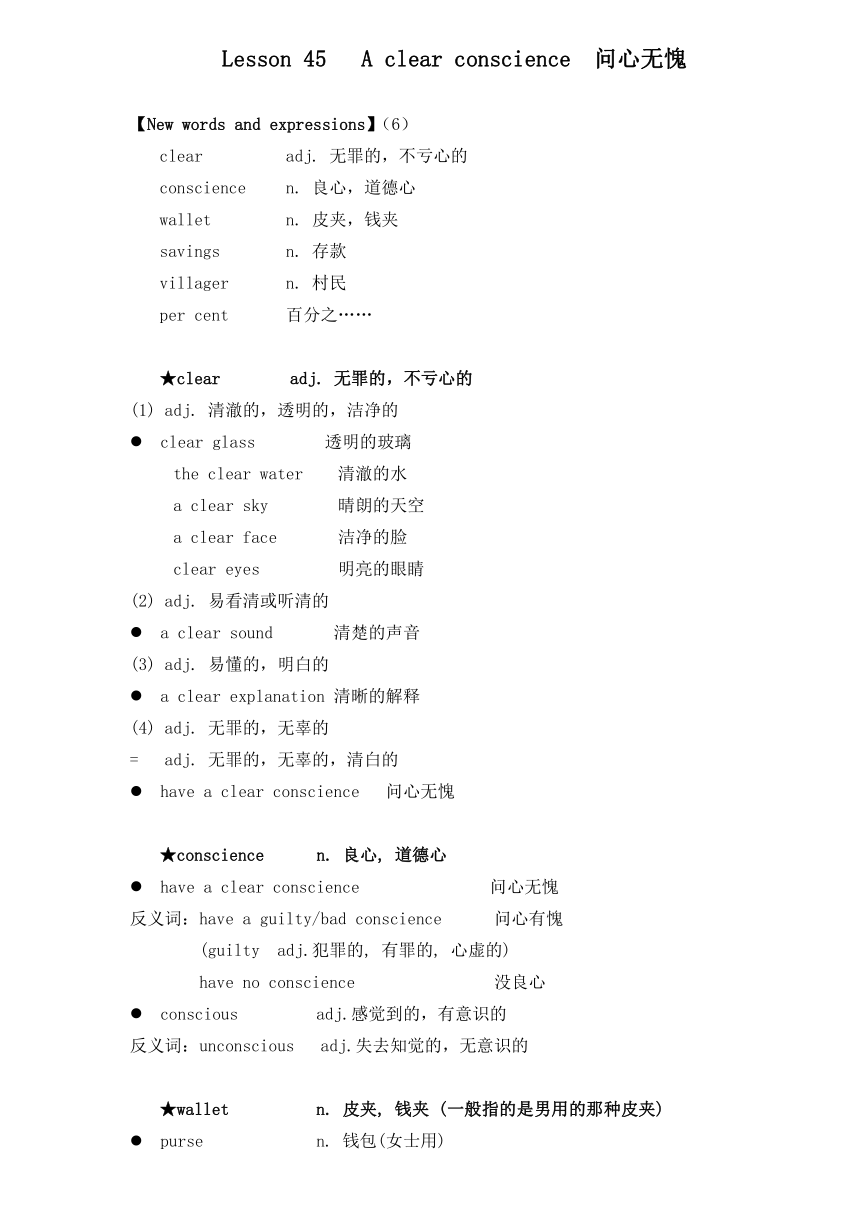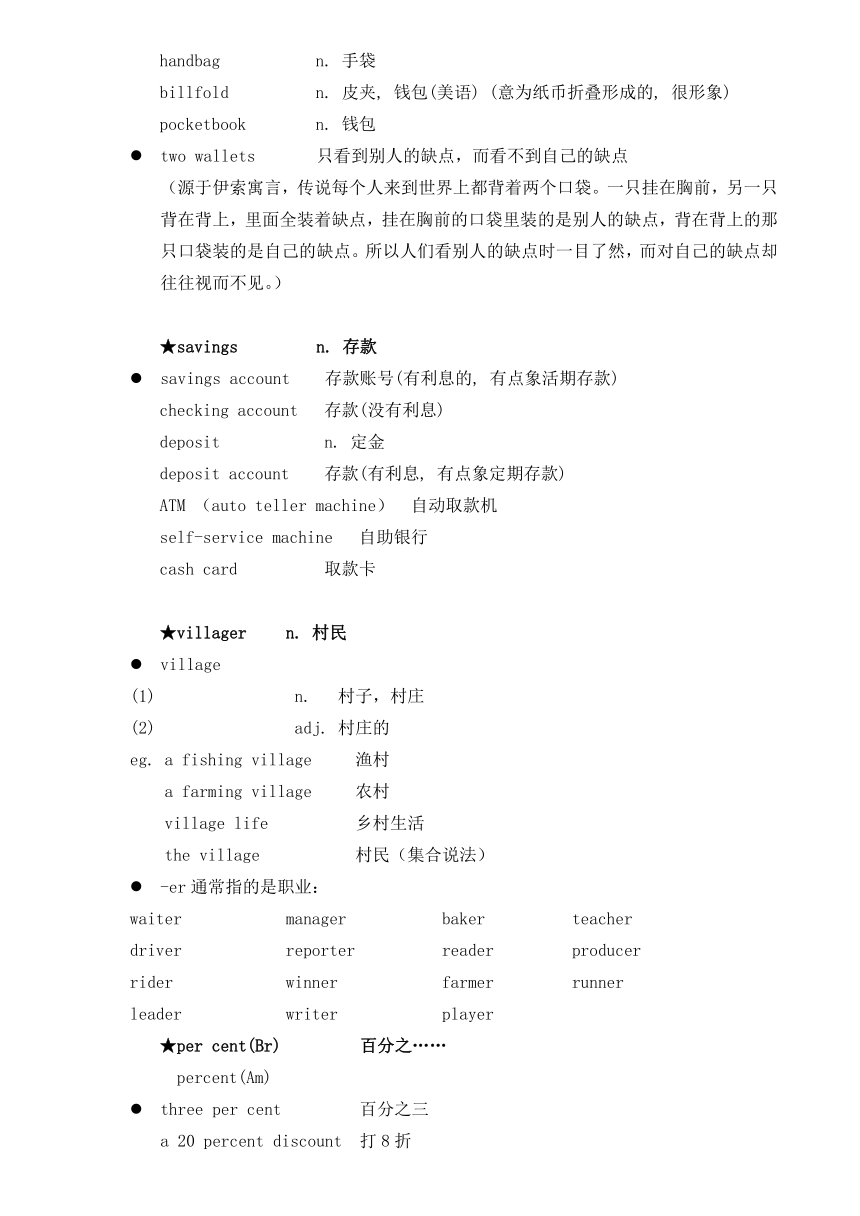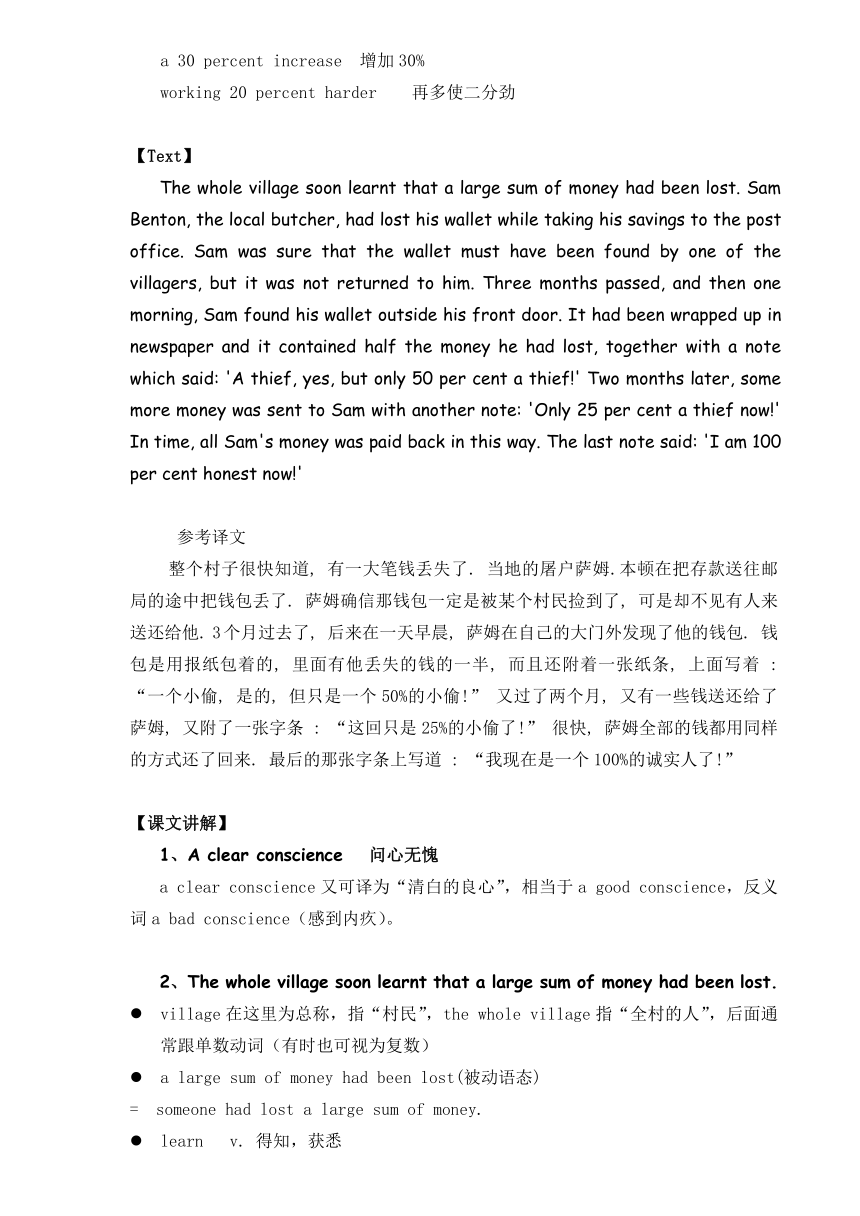新概念英语第二册 Lesson 45 A clear conscience 问心无愧笔记
文档属性
| 名称 | 新概念英语第二册 Lesson 45 A clear conscience 问心无愧笔记 |  | |
| 格式 | docx | ||
| 文件大小 | 32.2KB | ||
| 资源类型 | 教案 | ||
| 版本资源 | 新概念英语 | ||
| 科目 | 英语 | ||
| 更新时间 | 2023-09-26 06:30:55 | ||
图片预览



文档简介
Lesson 45 A clear conscience 问心无愧
【New words and expressions】(6)
clear adj. 无罪的,不亏心的
conscience n. 良心,道德心
wallet n. 皮夹,钱夹
savings n. 存款
villager n. 村民
per cent 百分之……
★clear adj. 无罪的,不亏心的
(1) adj. 清澈的,透明的,洁净的
clear glass 透明的玻璃
the clear water 清澈的水
a clear sky 晴朗的天空
a clear face 洁净的脸
clear eyes 明亮的眼睛
(2) adj. 易看清或听清的
a clear sound 清楚的声音
(3) adj. 易懂的,明白的
a clear explanation 清晰的解释
(4) adj. 无罪的,无辜的
= adj. 无罪的,无辜的,清白的
have a clear conscience 问心无愧
★conscience n. 良心, 道德心
have a clear conscience 问心无愧
反义词:have a guilty/bad conscience 问心有愧
(guilty adj.犯罪的, 有罪的, 心虚的)
have no conscience 没良心
conscious adj.感觉到的,有意识的
反义词:unconscious adj.失去知觉的,无意识的
★wallet n. 皮夹, 钱夹 (一般指的是男用的那种皮夹)
purse n. 钱包(女士用)
handbag n. 手袋
billfold n. 皮夹, 钱包(美语) (意为纸币折叠形成的, 很形象)
pocketbook n. 钱包
two wallets 只看到别人的缺点,而看不到自己的缺点
(源于伊索寓言,传说每个人来到世界上都背着两个口袋。一只挂在胸前,另一只背在背上,里面全装着缺点,挂在胸前的口袋里装的是别人的缺点,背在背上的那只口袋装的是自己的缺点。所以人们看别人的缺点时一目了然,而对自己的缺点却往往视而不见。)
★savings n. 存款
savings account 存款账号(有利息的, 有点象活期存款)
checking account 存款(没有利息)
deposit n. 定金
deposit account 存款(有利息, 有点象定期存款)
ATM (auto teller machine) 自动取款机
self-service machine 自助银行
cash card 取款卡
★villager n. 村民
village
n. 村子,村庄
adj. 村庄的
eg. a fishing village 渔村
a farming village 农村
village life 乡村生活
the village 村民(集合说法)
-er通常指的是职业:
waiter manager baker teacher
driver reporter reader producer
rider winner farmer runner
leader writer player
★per cent(Br) 百分之……
percent(Am)
three per cent 百分之三
a 20 percent discount 打8折
a 30 percent increase 增加30%
working 20 percent harder 再多使二分劲
【Text】
The whole village soon learnt that a large sum of money had been lost. Sam Benton, the local butcher, had lost his wallet while taking his savings to the post office. Sam was sure that the wallet must have been found by one of the villagers, but it was not returned to him. Three months passed, and then one morning, Sam found his wallet outside his front door. It had been wrapped up in newspaper and it contained half the money he had lost, together with a note which said: 'A thief, yes, but only 50 per cent a thief!' Two months later, some more money was sent to Sam with another note: 'Only 25 per cent a thief now!' In time, all Sam's money was paid back in this way. The last note said: 'I am 100 per cent honest now!'
参考译文
整个村子很快知道, 有一大笔钱丢失了. 当地的屠户萨姆.本顿在把存款送往邮局的途中把钱包丢了. 萨姆确信那钱包一定是被某个村民捡到了, 可是却不见有人来送还给他. 3个月过去了, 后来在一天早晨, 萨姆在自己的大门外发现了他的钱包. 钱包是用报纸包着的, 里面有他丢失的钱的一半, 而且还附着一张纸条, 上面写着 : “一个小偷, 是的, 但只是一个50%的小偷!” 又过了两个月, 又有一些钱送还给了萨姆, 又附了一张字条 : “这回只是25%的小偷了!” 很快, 萨姆全部的钱都用同样的方式还了回来. 最后的那张字条上写道 : “我现在是一个100%的诚实人了!”
【课文讲解】
1、A clear conscience 问心无愧
a clear conscience又可译为“清白的良心”,相当于a good conscience,反义词a bad conscience(感到内疚)。
2、The whole village soon learnt that a large sum of money had been lost.
village在这里为总称,指“村民”,the whole village指“全村的人”,后面通常跟单数动词(有时也可视为复数)
a large sum of money had been lost(被动语态)
= someone had lost a large sum of money.
learn v. 得知,获悉
a large sum of money 一大笔钱
a small sum of money 一小笔钱
3、Sam Benton, the local butcher, had lost his wallet while taking his savings to the post office.
Sam Benton 和the local butcher是同位语
butcher
n. 屠夫,肉商 the butcher’s 肉店
v. 屠杀,残杀
while doing是现在分词短语用于连词之后,作用相当于一个时间状语从句。现在分词这样用的前提是两个动词的主语是同一个,并且这两个动作通常是同时发生(即这句话一定要是进行时态)。如果主语不一致则必须用从句。
这句话完整的应为: while he was taking his savings to the post office.
4、Sam was sure that the wallet must have been found by one of the villagers, but it was not returned to him.
must have done 表示对过去的推测;
must have been done 表示对过去被动的推测
it was not returned to him 还没有被还回来(被动语态)
5、Three months passed, and then one morning, Sam found his wallet outside his front door.
主语:Sam 谓语:found 宾语:his wallet
宾语补足语:outside his front door
find + n. + adj. 发现…是…(n. adj. 作宾补)
eg. I found my cat asleep in my bed. 我发现我的猫在床上睡着了。
find + n. + adv./prep.(adv. prep. 作宾补)
eg. Cherry trees are found in most parts of Japan.
樱桃树在日本的很多地方都能被发现。
find + n.
eg. Did you find the pen you lost
find + that/wh 发现…事
三种表示一段时间以后,另外一件事情发生的方式:
…passed, and then
some time later
(3) some time passed before…
6、It had been wrapped up in newspaper and it contained half the money he had lost, together with a note which said: 'A thief, yes, but only 50 per cent a thief!'
wrap up 包裹
wrap
v. 包裹 (wrapped wrapped)
eg. The girl wrapped up her Christmas gift. 女孩把她的圣诞礼物包了起来。
It had been wrapped up in newspaper by somebody.
(用报纸包用in,不能用by)
v. 把…缠绕,把…披在
eg. He wrapped a scarf around his neck. 他把围巾围在脖子上。
be wrapped up in 全神贯注于
eg. He was wrapped up in watching TV. 他全神贯注于电视中。
it contained half the money he had lost
he had lost 作定语修饰money
half
half, all, both均称为前限定词,位于其他限定词(my, her, these, those等)
之前,这时of 可省略。
eg. She spends half (of)her time travelling. 她用一半时间旅游。
代词前始终用half of
eg. Only half of us could come last night. 昨天晚上我们只有一半人能来。
在度量衡前half 从不带of
eg. My old home is about half a mile from here. 我的旧屋离这里大约半英里。
a dozen eggs half a dozen eggs 半打鸡蛋
one and a half + n. (pl.)
eg. one and a half hours 一个半小时
half the money =half of the money
钱的一半(half 直接加在名词前表示 “一半” )
eg. half an hour 半个小时 , half a year 半年
Half the bread/half of the bread was bad.
together with a note 带着个小纸条
together with… = with… 随它一起的还有……(介词短语作状语)
eg. I with my son went there. 我带着我的儿子去了
My son and I went there. 我和我儿子去那里。
which said 作定语修饰note
a note said… 纸条上说……
the picture said… 图片上说……
newspaper said… 报纸上说……
thief 小偷
pickpocket 扒手
robber 强盗
steal sth. from sb. = steal sth. from sw. 从某人/某处偷来
rob sb. of sth. 抢了某人的东西(宾语只能是人)
7、Two months later, some more money was sent to Sam with another note: 'Only 25 per cent a thief now!'
some more money 又有一些钱 (more 又, 再)
was sent to Sam (过去时态的被动语态)
8、In time, all Sam's money was paid back in this way.
in time = in the end 最终,最后,经过一段时间
in time (1)终于(2)及时(3)合拍子
in no time = immediately 立即,马上
pay back (1)还钱(2)报复
in this way 用这种方式
in that way 用那种方式
in a way
在某种意义上来说
eg. You’re correct in a way. 某种意义来说你是对的。
有点,有几分
eg. She is strange in a way. 她有点奇怪。
9、The last note said: 'I am 100 per cent honest now!'
100 percent 百分之一百
【Special Difficulties】
Steal and Rob
steal (something from someone or somewhere) 偷(从某人或某处)
steal (sth.) from (sb.) steal后跟(被偷)物
The man who stole my wallet took my address book as well.
Someone has stolen my bag from me.
rob (someone of something )(a building,a blank,a house,etc.) 抢(某人的某物)(大楼、银行、房子等)
rob (sb.) of (sth.) rob后跟人或地方
I lost my address book when that man robbed me of my bag.
The police have caught the men who robbed the bank.
Pay back
① 偿还
Yesterday Sam borrowed some money from me and said that he would pay me back in a week.
② 报答;向……报复(pay sb. back)
You’ve been very kind to me. How can I pay you back
I’ll pay you back for what you did to me.
你对我这样,我一定会报仇的。
He embarrassed me at the party. I’ll pay him back someday.
【Key structures】
被动语态复习
be + v.ed
不及物动词无被动语态,如:take place, disappear
由be体现出不同时态
注意含有情态动词的被动语态
【New words and expressions】(6)
clear adj. 无罪的,不亏心的
conscience n. 良心,道德心
wallet n. 皮夹,钱夹
savings n. 存款
villager n. 村民
per cent 百分之……
★clear adj. 无罪的,不亏心的
(1) adj. 清澈的,透明的,洁净的
clear glass 透明的玻璃
the clear water 清澈的水
a clear sky 晴朗的天空
a clear face 洁净的脸
clear eyes 明亮的眼睛
(2) adj. 易看清或听清的
a clear sound 清楚的声音
(3) adj. 易懂的,明白的
a clear explanation 清晰的解释
(4) adj. 无罪的,无辜的
= adj. 无罪的,无辜的,清白的
have a clear conscience 问心无愧
★conscience n. 良心, 道德心
have a clear conscience 问心无愧
反义词:have a guilty/bad conscience 问心有愧
(guilty adj.犯罪的, 有罪的, 心虚的)
have no conscience 没良心
conscious adj.感觉到的,有意识的
反义词:unconscious adj.失去知觉的,无意识的
★wallet n. 皮夹, 钱夹 (一般指的是男用的那种皮夹)
purse n. 钱包(女士用)
handbag n. 手袋
billfold n. 皮夹, 钱包(美语) (意为纸币折叠形成的, 很形象)
pocketbook n. 钱包
two wallets 只看到别人的缺点,而看不到自己的缺点
(源于伊索寓言,传说每个人来到世界上都背着两个口袋。一只挂在胸前,另一只背在背上,里面全装着缺点,挂在胸前的口袋里装的是别人的缺点,背在背上的那只口袋装的是自己的缺点。所以人们看别人的缺点时一目了然,而对自己的缺点却往往视而不见。)
★savings n. 存款
savings account 存款账号(有利息的, 有点象活期存款)
checking account 存款(没有利息)
deposit n. 定金
deposit account 存款(有利息, 有点象定期存款)
ATM (auto teller machine) 自动取款机
self-service machine 自助银行
cash card 取款卡
★villager n. 村民
village
n. 村子,村庄
adj. 村庄的
eg. a fishing village 渔村
a farming village 农村
village life 乡村生活
the village 村民(集合说法)
-er通常指的是职业:
waiter manager baker teacher
driver reporter reader producer
rider winner farmer runner
leader writer player
★per cent(Br) 百分之……
percent(Am)
three per cent 百分之三
a 20 percent discount 打8折
a 30 percent increase 增加30%
working 20 percent harder 再多使二分劲
【Text】
The whole village soon learnt that a large sum of money had been lost. Sam Benton, the local butcher, had lost his wallet while taking his savings to the post office. Sam was sure that the wallet must have been found by one of the villagers, but it was not returned to him. Three months passed, and then one morning, Sam found his wallet outside his front door. It had been wrapped up in newspaper and it contained half the money he had lost, together with a note which said: 'A thief, yes, but only 50 per cent a thief!' Two months later, some more money was sent to Sam with another note: 'Only 25 per cent a thief now!' In time, all Sam's money was paid back in this way. The last note said: 'I am 100 per cent honest now!'
参考译文
整个村子很快知道, 有一大笔钱丢失了. 当地的屠户萨姆.本顿在把存款送往邮局的途中把钱包丢了. 萨姆确信那钱包一定是被某个村民捡到了, 可是却不见有人来送还给他. 3个月过去了, 后来在一天早晨, 萨姆在自己的大门外发现了他的钱包. 钱包是用报纸包着的, 里面有他丢失的钱的一半, 而且还附着一张纸条, 上面写着 : “一个小偷, 是的, 但只是一个50%的小偷!” 又过了两个月, 又有一些钱送还给了萨姆, 又附了一张字条 : “这回只是25%的小偷了!” 很快, 萨姆全部的钱都用同样的方式还了回来. 最后的那张字条上写道 : “我现在是一个100%的诚实人了!”
【课文讲解】
1、A clear conscience 问心无愧
a clear conscience又可译为“清白的良心”,相当于a good conscience,反义词a bad conscience(感到内疚)。
2、The whole village soon learnt that a large sum of money had been lost.
village在这里为总称,指“村民”,the whole village指“全村的人”,后面通常跟单数动词(有时也可视为复数)
a large sum of money had been lost(被动语态)
= someone had lost a large sum of money.
learn v. 得知,获悉
a large sum of money 一大笔钱
a small sum of money 一小笔钱
3、Sam Benton, the local butcher, had lost his wallet while taking his savings to the post office.
Sam Benton 和the local butcher是同位语
butcher
n. 屠夫,肉商 the butcher’s 肉店
v. 屠杀,残杀
while doing是现在分词短语用于连词之后,作用相当于一个时间状语从句。现在分词这样用的前提是两个动词的主语是同一个,并且这两个动作通常是同时发生(即这句话一定要是进行时态)。如果主语不一致则必须用从句。
这句话完整的应为: while he was taking his savings to the post office.
4、Sam was sure that the wallet must have been found by one of the villagers, but it was not returned to him.
must have done 表示对过去的推测;
must have been done 表示对过去被动的推测
it was not returned to him 还没有被还回来(被动语态)
5、Three months passed, and then one morning, Sam found his wallet outside his front door.
主语:Sam 谓语:found 宾语:his wallet
宾语补足语:outside his front door
find + n. + adj. 发现…是…(n. adj. 作宾补)
eg. I found my cat asleep in my bed. 我发现我的猫在床上睡着了。
find + n. + adv./prep.(adv. prep. 作宾补)
eg. Cherry trees are found in most parts of Japan.
樱桃树在日本的很多地方都能被发现。
find + n.
eg. Did you find the pen you lost
find + that/wh 发现…事
三种表示一段时间以后,另外一件事情发生的方式:
…passed, and then
some time later
(3) some time passed before…
6、It had been wrapped up in newspaper and it contained half the money he had lost, together with a note which said: 'A thief, yes, but only 50 per cent a thief!'
wrap up 包裹
wrap
v. 包裹 (wrapped wrapped)
eg. The girl wrapped up her Christmas gift. 女孩把她的圣诞礼物包了起来。
It had been wrapped up in newspaper by somebody.
(用报纸包用in,不能用by)
v. 把…缠绕,把…披在
eg. He wrapped a scarf around his neck. 他把围巾围在脖子上。
be wrapped up in 全神贯注于
eg. He was wrapped up in watching TV. 他全神贯注于电视中。
it contained half the money he had lost
he had lost 作定语修饰money
half
half, all, both均称为前限定词,位于其他限定词(my, her, these, those等)
之前,这时of 可省略。
eg. She spends half (of)her time travelling. 她用一半时间旅游。
代词前始终用half of
eg. Only half of us could come last night. 昨天晚上我们只有一半人能来。
在度量衡前half 从不带of
eg. My old home is about half a mile from here. 我的旧屋离这里大约半英里。
a dozen eggs half a dozen eggs 半打鸡蛋
one and a half + n. (pl.)
eg. one and a half hours 一个半小时
half the money =half of the money
钱的一半(half 直接加在名词前表示 “一半” )
eg. half an hour 半个小时 , half a year 半年
Half the bread/half of the bread was bad.
together with a note 带着个小纸条
together with… = with… 随它一起的还有……(介词短语作状语)
eg. I with my son went there. 我带着我的儿子去了
My son and I went there. 我和我儿子去那里。
which said 作定语修饰note
a note said… 纸条上说……
the picture said… 图片上说……
newspaper said… 报纸上说……
thief 小偷
pickpocket 扒手
robber 强盗
steal sth. from sb. = steal sth. from sw. 从某人/某处偷来
rob sb. of sth. 抢了某人的东西(宾语只能是人)
7、Two months later, some more money was sent to Sam with another note: 'Only 25 per cent a thief now!'
some more money 又有一些钱 (more 又, 再)
was sent to Sam (过去时态的被动语态)
8、In time, all Sam's money was paid back in this way.
in time = in the end 最终,最后,经过一段时间
in time (1)终于(2)及时(3)合拍子
in no time = immediately 立即,马上
pay back (1)还钱(2)报复
in this way 用这种方式
in that way 用那种方式
in a way
在某种意义上来说
eg. You’re correct in a way. 某种意义来说你是对的。
有点,有几分
eg. She is strange in a way. 她有点奇怪。
9、The last note said: 'I am 100 per cent honest now!'
100 percent 百分之一百
【Special Difficulties】
Steal and Rob
steal (something from someone or somewhere) 偷(从某人或某处)
steal (sth.) from (sb.) steal后跟(被偷)物
The man who stole my wallet took my address book as well.
Someone has stolen my bag from me.
rob (someone of something )(a building,a blank,a house,etc.) 抢(某人的某物)(大楼、银行、房子等)
rob (sb.) of (sth.) rob后跟人或地方
I lost my address book when that man robbed me of my bag.
The police have caught the men who robbed the bank.
Pay back
① 偿还
Yesterday Sam borrowed some money from me and said that he would pay me back in a week.
② 报答;向……报复(pay sb. back)
You’ve been very kind to me. How can I pay you back
I’ll pay you back for what you did to me.
你对我这样,我一定会报仇的。
He embarrassed me at the party. I’ll pay him back someday.
【Key structures】
被动语态复习
be + v.ed
不及物动词无被动语态,如:take place, disappear
由be体现出不同时态
注意含有情态动词的被动语态
同课章节目录
